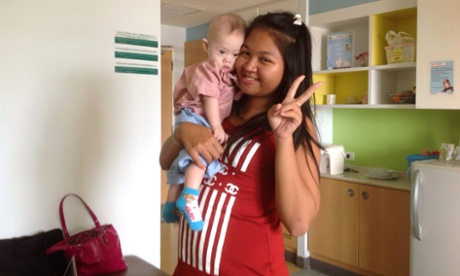Surrogacy Is Still Available to Paedophiles. This Must Change – but How?
By Richard Ackland
As the baby Gammy story hit the headlines, Australians suddenly realised that a person with 22 child sex convictions, including unlawful and indecent dealing with girls as young as seven years old, can have a baby girl by surrogacy – and the law is silent. So what can be done about it? One way of making children safe would be to licence intending parents. A great government agency handing out permissions for people to have children would be just the ticket. Who will licence the licensers and what criteria or tests will be applied are difficulties that could be managed by skilfully drafted legislation. This uniform law would be administered by a reproductive management commission, safely housed in Kevin Andrews’ department of social services. First and foremost the commission would be licensing quality people, people who are likely to produce superior children. The permitted progeny don’t necessarily have to have blond hair or blue eyes, but that would be a discretion left to the minister. Importantly, there would be list of certain categories of people who would be refused licences, subject to a merits review by a board consisting of ministerial delegates. This list would include those with convictions for murder, rape, terrorism, kidnapping, drug offences, one punch violations, and corruption. Certain quasi criminal or civil offences could also be added, such as people who double park or violate section 18C of the racial discrimination act, or those whose metadata shows they have visited porn sites or quadrant.org.au. Instead, we’re stuck in a world where any crim, maintenance dodger, wife beater or draft dodger can conceive a child. I hope the tongue-in-cheek element here is self-evident, although you can never be too sure. Even so, it’s surprising Joe Hockey hasn’t talked up the possibilities. Nevertheless, the law surrounding surrogacy and adoption is quite opaque across Australia. The area is filled by what lawyers love to call lacunae. The only place that requires background checks for parents intending to have a child by surrogacy is Victoria, although happily all states seem to require counselling or legal advice. Altruistic surrogacy is legal across the wide brown land, while domestic commercial surrogacy is not. Some jurisdictions recognise overseas commercial surrogacy arrangements, but Queensland, NSW and the ACT don’t. In any event, the rapid growth of offshore commercial surrogacy shows that there are significant law enforcement problems. To make matters more interesting, under Thai law the surrogate mother remains the legal mother of the child. In 2012 John Pascoe, the chief judge of the federal circuit court, called for the legalisation of onshore commercial surrogacy with the aim of reducing the traffic in the offshore commercial variety. Nicola Roxon, attorney general at the time, asked the Family Law Council to review parentage in the context of the family law act. The report was completed in December last year and bingo, yesterday it was released by Commonwealth attorney general senator Brandis. The council made 19 recommendations, most unrelated to surrogacy, but importantly it did say that the Australian law reform commission should be asked by the government to “conduct an inquiry into the full range of issues raised by international surrogacy and its impact on Commonwealth laws”. The Standing Council on Law and Justice has issued a proposal for a national model for the regulation of surrogacy, and a NSW parliamentary committee is reviewing the surrogacy act in that state. So things are somewhere in the pipeline, but in the meantime no one has been specifically focused on a regime which would prevent convicted paedophiles from having children by either altruistic or commercial offshore surrogacy. In other words, there are no proactive safeguards, but there are reactive ones – including the removal by state or territory agencies of children at risk. There are no guarantees in the child protection system, and in this context it is interesting that a former NSW community services worker is being sued for negligence by two women who say that they were not protected from their stepfather’s sexual abuse, despite the case officer and the department knowing about it. There is also another possible protective mechanism: an effective application of child sex offender registers. All states and territories have some form of sex offender reporting and registration procedures, and that information was recently very handily collated by the Australian Institute of Family Studies at the request of the Royal Commission into Institutional Responses to Child Sexual Abuse. To qualify for a place of the register you have to be convicted, so it not so much of a worry for unconvicted child sex offenders. The idea is that registration assists the monitoring of sex offenders, although how that works in practice is not always clear. When it comes to adoption, again, nothing is precise. In NSW and Victoria people with criminal convictions are not expressly precluded from adopting, but criminal history is a factor to be considered in the adoption application process. Presumably, an applicant seeking to adopt a child with a history of child sexual offences would be unlikely to be successful. In Western Australia, the home of Mr and Mrs Farnell of Baby Gammy infamy, people cannot even apply to adopt a child if they have been convicted of a class one offence (child sex crimes). That said, they can go abroad without a background check to pursue a surrogacy. All sorts of offenders can become the parent of a child by extra-jurisdictional surrogacy or other forms of assisted reproduction and fly under the radar of suitability tests. Human rights for paedophile fathers-to-be are still intact. Clearly, something needs to happen at the national level – even if for political reasons, a national parental licensing scheme might be more unpopular than the collection of citizens’ metadata.
|
.
Any original material on these pages is copyright © BishopAccountability.org 2004. Reproduce freely with attribution.
